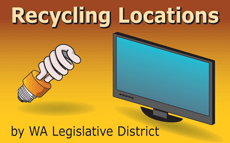
Medicine: Non-profit Programs
Teleosis Institute's Green Pharmacy Program
The Teleosis Institute, a non-profit organization promoting sustainable medicine, launched the Green Pharmacy Campaign, in May 2007. The campaign is a collaboration with local pharmacies, health providers, and consumers, aimed at reducing the "footprint" of pharmaceutical medicine.
The program has launched multiple pilot take-back sites in Bay Area pharmacies, medical and dental offices, veterinarian hospitals, health care facilities, and local recycling events. Through the program, Teleosis educates and engages manufacturers, distributors, pharmacists, physicians, consumers, and waste management to participate in a solution to the growing problem of pharmaceutical pollution in environment. In addition, data is collected and analyzed for information such as average wholesale price and toxicity of drugs returned. For more information, view the January 2008 Press Release
The Spring/Summer 2007 issue of Symbiosis, a Teleosis Journal, focused on Green Pharmacy: Pharmaceutical Pollution Prevention.
2006 Bay Area Pollution Prevention Group (BAPPG)
The Bay Area Pollution Prevention Group piloted a first-of-its-kind regional collection event for residential pharmaceutical waste in May 2006. Throughout the Bay Area, more than 1,500 residents disposed of 3,634 lbs of pharmaceutical waste at 39 locations. The BAPPG coordinated this pilot program with 17 agencies that managed the collection event details, which included location, staffing, police presence, and documentation of controlled substances.
Residents were asked to participate in a survey at each collection event. The survey results found that one quarter of participants had previously disposed of medication down the sanitary sewer, while close to half previously disposed of medication in the trash.
The overall goals of the events were to:
- Provide residents with an easy disposal option for their unwanted pharmaceutical waste
- Increase residents’ understanding that items placed in the toilet and sink eventually ends up in the Bay
Individual agencies were responsible for coordinating and staffing their local collection events that were held at Walgreens, Senior Centers, and City Halls.
Agencies were not only in charge of staffing the event, but they also managed the disposal of the pharmaceutical waste. Some agencies utilized local agencies to dispose of their pharmaceutical waste, which includes Fire Departments, Police Departments, Local Narcotic tasks forces or a local Household Hazardous Waste program. Five of the agencies directly paid for the disposal of the pharmaceutical waste, which amounted to $3,645, or about $1.81 per pound of material collected. The total cost of the program was $90,000, including advertising, or $450 per pound disposed.
Pounds collected: 3,634 pound
Pharmacies: 39
More information: Highlights and Lessons Learned from the 2006 SF Bay Area’s Safe Medicine Disposal Days (PPT file, 526KB) presentation at the Annual Unused Drug Return International Conference
The Northeast Recycling Council (NERC)
NERC is a ten-state non-profit organization dedicated to recycling and product stewardship in a variety of product fields. Unwanted or expired medications are one of the products with which NERC is involved. NERC was awarded an Innovative Solid Waste Grant by the U.S. Environmental Protection Agency to develop environmentally sound and legal strategies for collecting and disposing of unwanted medications. The collection strategy on which NERC has focused its efforts is that of holding pharmaceutical collection events. NERC has planned and implemented pharmaceutical collection events in a number of jurisdictions in New England. These events have been held in a variety of settings, including senior centers, household hazardous waste events and retail pharmacies.
In order to comply with U.S. DEA regulations, NERC always has law enforcement officials on-site at the pharmaceutical collection events. The law enforcement officials participate in the collection event and take physical control and custody of all controlled substances. NERC also has pharmacists at the collection events so that the controlled substances can be separated from the other pharmaceuticals that are turned in at these events. At the end of the event an inventory of the collected controlled substances is prepared and the police take custody of those pharmaceuticals. The pilot Maine collection event cost $8,000 in labor costs for collection of 119 lbs.
A hazardous waste disposal firm then takes possession of the drugs and transports them (with witnesses) to the final disposal site. NERC is committed to the witnessed destruction of the collected controlled substances in a hazardous waste incinerator. Hazardous waste incineration is NERC's preferred disposal method for non-controlled substances as well.
NERC is interested in determining the best management practices for medication containers and believes that recycling of plastic containers is the preferred management practice, provided that the container is empty of medication. NERC believes that further study of the pharmaceutical packaging industry and retail pharmacy practices can help reduce the use of environmentally harmful packaging materials and facilitate recycling in the future.
Although NERC endorses a product stewardship strategy, the pilot pharmaceutical collection events it has helped organize have been funded in other ways (e.g. contributions from organizations sponsoring or helping to put on the collection events). NERC is interested in working toward a system of shared responsibility for reducing the adverse environmental and health impacts associated with the life cycle of consumer products.
Pounds collected: 119 lbs (2005 pilot program)
Pharmacies: 6
For more information: NERC provides reports, recommendations and guidelines on unwanted medication collections.
